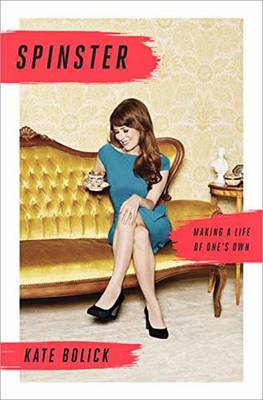
"A single woman considers her life, the life of the bold single ladies who have gone before her, and the long arc of slowly changing attitudes towards women"--
This was not quite the book I thought it was going to be. That's not to say it isn't good; it's left me with much to think about, but ultimately I was hoping for something slightly different.
Based on the title and summary, I was expecting a book about a woman who made the conscious choice to live her own life, one that embraced the solitude she craved and was the result of her own conscious will and choices.
What I got was a woman who was pretty sure she wanted a life of her own making, but lacked the self-awareness to recognise that pretty much every one of her choices were aimed at making sure she was never alone. By her own admission, in the 10+ years she lived in NYC chasing a solitary life, she was never alone. When she wasn't in a relationship, she dated constantly, and filled her nights with nonstop socialising. The few attempts she chronicles here at true solitude never last more than 2 weeks (and those two weeks had several "social" episodes).
What kept me reading was the similarity in life experiences Bolick and I shared - generally speaking. After long term monogamous relationships in our 20's, we discovered independence in our 30's and, I think, shared similar questions concerning a life of one's own and what that meant. To a point. We diverge philosophically, however, in several places.
Now, this is, of course, just my opinion and based on my life experiences, which, it goes without saying, are not everyone's. But having said that, her premise from the beginning is flawed:
"Whom to marry, and when will it happen–these two questions define every woman's existence, regardless of where she was raised or what religion she does or doesn't practice."
No they don't. They've never defined mine, anyway.
"Eventually, whether you choose or are chosen, joyously accept or grudgingly resist, you take the plunge.
You are born, you grow up, you become a wife."
Fatalistic much?
"But what if it wasn't this way?
What if a girl grew up like a boy, with marriage an abstract, someday thought, a thing to think about when she became an adult, a thing she could do, or not do, depending?
What would that look and feel like?"
Uh, it would look like me, and I guess it would feel pretty good? I don't have anything else to compare it to, but I'm happy to have not had the constriction.
I never heard my mother say "when you get married" or "when you have kids". She constantly told me I could be whatever I wanted, making suggestions like artist, or cartoonist (mom goggles), but never once mentioned marriage. The only comment she ever made about children, she only made once "If you're going to have any kids, just have them before I die so I can meet them.". So I definitely grew up "like a boy". (nb: my parents were married over 50 years, setting a stupidly high bar for happiness.)
All of this to say that Bolick's assertions that all women of our generation are locked into this stultifying cultural expectation is false from the get-go. I understand that my mom may not have been the norm, but she wasn't a rarity either; my childhood wasn't special or unique.
Amidst all the navel-gazing, Bolick weaves the lives of 5 female authors that greatly influenced her journey to better self-awareness: Neith Boyce, Maeve Brennan, Charlotte Perkins Gilman, Edna St. Vincent Millay and Edith Wharton. She examines their lives and uses what she learns about them to figure out what it is she's trying to do for herself. Self-analysis by literary analysis. The device works, and I enjoyed learning about these ground-breaking women, although I think she might have romanticised their lives a bit.
Bolick ties all of this, of course, to women's rights and feminism (although she rarely calls it feminism); it would be illogical to do anything else. This book, our lives, would not be possible without these women and others like themselves. But she takes it all a tiny step too far. She argues that this imperative to marry, to have kids, to avoid being alone, dying alone, is the solemn birthright of women. To which I say, that's a load of codswallop.
Of course there's an unarticulated expectation for men to marry (an unmarried woman may be called a spinster, but an unmarried man has his sexuality questioned), and of course they feel this. In most of the relationships around me, it's the men who have wanted to start families first, who are eager to become fathers, while simultaneously worrying that their lives will end if they do. And I don't think anybody wants to die alone or remain unloved, or end up on the streets. These are not gender specific worries, or desires, or fears, and by making them so, she perpetuates the separation that feminists fight so hard against.
Now, after sounding like I'm thoroughly bashing her efforts, I'm going to switch directions and say this is a very well written book. There was more in here to agree with than disagree, once beyond the basic premise itself, and the author is refreshingly honest with both herself and the reader. She spends a lot of time looking in the mirror and she doesn't waste a lot of her or the reader's time rationalising her decisions or her actions. You get the sense at the end that the journey wasn't in vain, and that perhaps she's finally stood still long enough to embrace solitude and really make a life of her own.
Reading updates
-
Started reading
-
4 February, 2017:
Finished reading
-
4 February, 2017:
Reviewed
